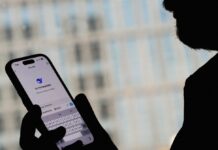“Look, it depends on the state,” Biden said this week, when questioned about renewed restrictions on businesses and schools from governors who are also pleading with Americans to skip Thanksgiving gatherings next week.
Biden is communicating dual health and economic concerns as some states return to shutdowns similar to those in the spring.
He’s been urging Americans to wear masks, asking reporters this week whether anybody understands “why a governor would turn this into a political statement.” Biden added: “It’s about patriotism.”
And yesterday he asked people to observe social distancing recommendations, saying Thanksgiving celebrations should be limited to 10 people and announcing he’ll be spending the holiday with just three people.
The Post’s Amy B. Wang asked the question we’re all wondering:
Yet Biden aides have repeatedly pivoted away from questions about shutdowns, with one top adviser telling my colleagues Annie Linskey and Sean Sullivan that Biden has privately said he doesn’t favor them.
“Biden’s attempts to steer away from shutdowns and the accompanying economic damage reveal just how toxic his team believes that remedy to be — even for a candidate who pledged that Americans can handle hard truths about the pandemic and as governors in some states are instituting restrictions,” they wrote.
Many governors are reinstating restrictions while others refuse.
Political leaders are between a rock and a hard place, grappling with severe economic strains caused by months of shutdowns on businesses and industry, while facing the threat of hospital systems being overwhelmed by covid-19 patients. Infections are spreading faster than during the spring and summer surges, with 1 in 100 U.S. residents estimated to be contagious with the virus at this moment.
California Gov. Gavin Newsom (D) has taken dramatic steps, with 94 percent of the state’s residents living under the most restrictive stage of reopening, with indoor dining, fitness center workouts and in-person religious services suspended.
Newsom announced he was pulling the state’s “emergency brake” to confront coronavirus spread that was “simply without precedent in California’s pandemic history.”
“Bottom line is, we’re moving from a marathon to a sprint,” he said.
Oregon, Washington and Michigan have also shut down indoor dining. Chicago’s mayor has issued a stay-at-home advisory. Philadelphia’s mayor is prohibiting most indoor gatherings until Jan. 1.
New York City Mayor Bill de Blasio (D) is returning public schools to virtual classes, starting today.
De Blasio said it’s because the city’s coronavirus infection rate rose to 3 percent on a seven-day rolling average.
Kentucky Gov. Any Beshear (D) went a step further, explaining all public and private schools must close Nov. 23 and that all public universities must do the same. Middle and high schools are staying shut until Jan. 4, and only elementary schools in areas without soaring infections will be allowed to reopen Dec. 7. Similar closures are happening around the country.
“In Texas, Utah, Michigan, Georgia, Indiana and other states, some districts are temporarily closing schools that already opened, often because of pandemic-caused staffing shortages,” Valerie Strauss reports. “In other places, including Chicago, Philadelphia, Boston, San Diego, Sacramento, Minneapolis and Topeka, Kan., districts have put off plans to reopen school buildings for the first time this academic year.”
Some GOP governors have changed their tune on masks.
The governors of Iowa, Utah and North Dakota once resisted mask mandates but are now embracing them, Amber Phillips reports.
After calling mask-wearing a “feel-good” measure, Iowa Gov. Kim Reynolds (R) signed a proclamation requiring Iowans over age 2 to wear masks in indoor public spaces.
“It’s up to all of us so that the worst-case scenarios I just described don’t become reality,” Reynolds said Monday in a prime-time address to Iowans in which she discussed the state’s virtually unchecked virus spread.
Utah Gov. Gary Herbert (R) originally framed a mask mandate as a burden, but last week he urged state residents to wear masks in a video message.
“We cannot afford to debate this issue any longer,” Herbert said in the video. “Individual freedom is certainly important, and it is our rule of law that protects that freedom.”
And North Dakota Gov. Doug Burgum (R) has announced statewide mask requirements that carry the potential of up to $1,000 in fines for violations.
Ahh, oof and ouch
AHH: The FDA approved the first rapid at-home coronavirus test.
The single-use home test kit from California biotechnology company Lucira Health sells for less than $50 and can generate a test result in as few as 11 minutes, Teo Armus and Meryl Kornfield. The test, which requires a prescription from a doctor, could allow people to remain in isolation, avoiding clinics and hospitals where they could spread the virus further.
“Unlike rapid antigen tests, which experts warn can be unreliable, the kit will test genetic material in a method similar to the laboratory tests that have become the standard for detecting the virus,” Teo and Meryl write. “The company said that when it compared its test to one of the most reliable FDA-authorized tests out now, it agreed with positive and negative results 94.1 percent and 98 percent of the time respectively in a study of more than 100 people in California.”
The test may be available soon for patients in Northern California’s Sutter Health and South Florida’s Cleveland Clinic but is unlikely to reach the national market until spring 2021.
Companies have been racing to develop a rapid at-home test, with many pursuing antigen tests, which detect proteins on the surface of the virus and are less sensitive than genetic tests. But manufacturers have struggled to meet higher accuracy standards imposed by the FDA for at-home tests.
A Danish study found that masks provided little protection to wearers, but the conclusions contradict other research.
Researchers in Denmark did not find a statistically significant benefit for participants who wore masks, according to a large randomized trial published on Wednesday in the Annals of Internal Medicine. But laboratory studies have suggested masks provide a benefit, as well as guidance the Centers for Disease Control and Prevention issued last week, the New York Times’s Gina Kolata reports. The study did not contradict findings that masks protect others.
“Critics were quick to note the study’s limitations, among them that the findings depended heavily on participants reporting their own test results and behavior, at a time when both mask-wearing and infection were rare in Denmark,” Kolata writes.
The study results come from 4,860 participants, half of whom were given surgical masks and instructed to wear them in public, while the other group was given no special instructions. At the time of the study, social distancing was common in Denmark, but mask-wearing was not. While a lower percentage of participants in the mask-wearing group were infected with the coronavirus (about 1.8 percent) compared to the group without masks (2.1 percent infected), the difference was not statistically significant.
Some scientists pointed out that the study cannot tease out the protection from different types of masks or for people with different levels of exposure.
Still, the study reinforces that masks are not a “magic bullet,” according to Christine Laine, editor in chief of the Annals of Internal Medicine. “There are people who say, ‘I’m fine, I’m wearing a mask.’ They need to realize they are not invulnerable to infection,” Laine said.
OUCH: Top health-care leaders were present at a birthday dinner with the California governor, despite coronavirus restrictions.
California Medical Association officials — including CEO Dustin Corcoran and lobbyist Janus Norman — attended a dinner at the French Laundry, an upscale restaurant, alongside Newsom to celebrate the birthday of Newsom’s longtime adviser Jason Kinney. At the time of the dinner state guidelines prohibited more than three households from gathering privately, although restaurants were not restricted from seating more than three households together, Politico’s Jeremy B. White and Victoria Colliver report.
“While Newsom and Kinney’s lobbying firm have said the meal abided by public health rules, it has struck a chord with Californians who have assailed the upscale soiree as hypocritical as coronavirus cases surge,” White and Colliver report.
Newsom has insisted that the dinner was outdoors, but it appears to have been held in “what amounts to a fancy garage, with walls on three sides and a roof,” While and Colliver report.
Fox 11 reporter Bill Melugin:
More in coronavirus
- Hospital systems are ramping up artificial intelligence systems to predict how likely covid-19 patients are to require a ventilator or die, but some researchers worry that systems trained on limited data sets could produce unreliable results, Stat News’s Erin Brodwin reports.
- Basic research funded by the government was crucial to the technology behind the Pfizer and Moderna vaccines, Kaiser Health News’s Arthur Allen writes.
- Coronavirus cases in nursing homes topped 10,000 during the week of Nov. 1, reaching an all-time high and underscoring the difficulty long-term care facilities have had in shielding residents when virus rates are high in the community, USA Today’s Ken Alltucker reports.
Elsewhere in health care
A top Biden adviser could face pressure to recuse himself over pharma issues because of his brother’s lobbying.
“Steve Ricchetti, who on Tuesday was named counselor to the president in Biden’s eventual administration, has a brother, Jeff, who was hired to lobby for pharmaceutical firms while Biden was running for president, according to disclosure reports,” CNBC’s Brian Schwartz reports.
Ricchetti could face pressure to recuse himself from issues involving drug pricing to avoid a conflict of interest over his brother’s work on behalf of pharmaceutical firms GlaxoSmithKline and Horizon Therapeutics. This could remove Richetti from key areas of policy discussion if Biden moves forward on campaign promises to reduce lower prescription prices.
Steve Richetti has his own history of lobbying for major health-care clients as well. He co-founded lobbying shop Richetti Inc. with his brother more than a decade ago and worked on behalf of a number of major clients in the health industry, including drugmakers Novartis, Eli Lilly and Sanofi, the American Hospital Association and health IT company NaviMedix, before becoming a top adviser to Biden in 2012, when Biden was vice president, according to the American Prospect.
Only 18 children with Down syndrome were born in Denmark in 2019.
Nearly all expectant mothers in Denmark take a prenatal genetic test, and nearly 95 choose to abort if the test results indicate a Down syndrome diagnosis, resulting in a dwindling population of people with the syndrome defined by an extra copy of chromosome 21, the Atlantic’s Sarah Zhang writes in a story exploring the ethical quandaries and human stories around prenatal genetic testing.
“The forces of scientific progress are now marching toward ever more testing to detect ever more genetic conditions. Recent advances in genetics provoke anxieties about a future where parents choose what kind of child to have, or not have. But that hypothetical future is already here. It’s been here for an entire generation,” Zhang writes.
Zhang tells the story of Grete Fält-Hansen, the head of Denmark’s National Down Syndrome Association, and the mother of an 18-year-old son with Down syndrome. Falt-Hansen, who finds herself “in the strange position of leading an organization likely to have fewer and fewer new members,” receives calls from expectant parents who have just received positive results for Down syndrome from a prenatal screening test. She does not try to sway them against abortion but instead to “fill in the texture of daily life” beyond cliches or lists of symptoms.
The possibilities for genetic selection are rapidly expanding, especially for those with money, and include not only prenatal testing and abortion, but also pre-implantation testing of embryos created through in vitro fertilization and genetic screening for sperm donors. The number of conditions screened for is also increasing, along with demand for tests for even more conditions, including autism.








